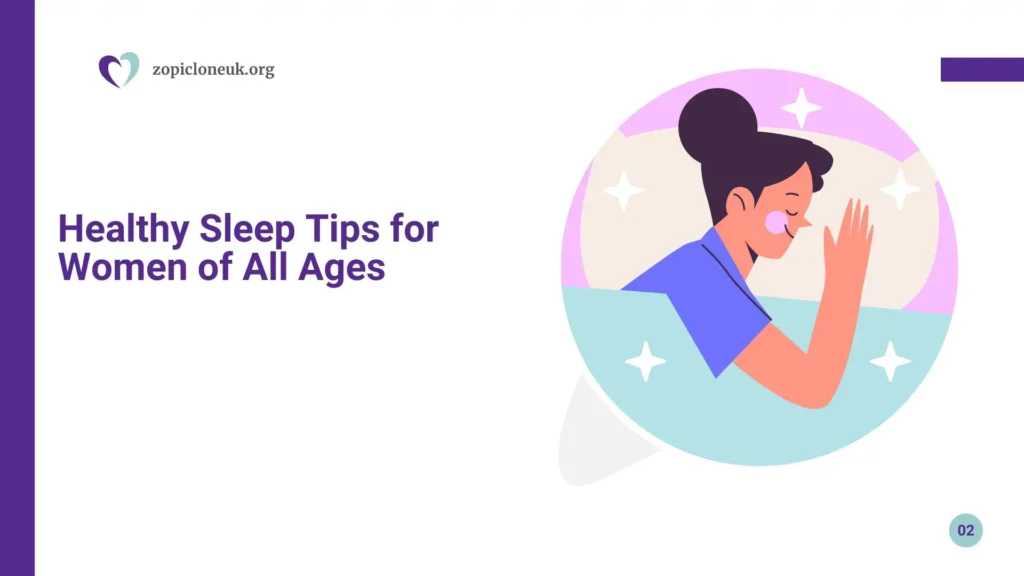
Healthy Sleep Tips for Women of All Ages:- Sleep is essential for overall health, particularly for women, who often juggle multiple roles and responsibilities. Yet, many women experience sleep difficulties due to factors like hormonal changes, stress, and lifestyle demands. This blog aims to provide comprehensive and practical sleep tips tailored to women of all ages, ensuring that they achieve the restful sleep needed for optimal health.
Contents
- 0.1 The Importance of Sleep for Women
- 0.2 Healthy Sleep Tips for Women
- 0.3 Extra Tips for Better Sleep
- 0.4 Addressing Sleep Disorders
- 0.5 FAQ
- 0.6 Q1: How much sleep do women need?
- 0.7 Q2: What is the best sleep position for women?
- 0.8 Q3: How can I manage sleep disturbances during menopause?
- 0.9 Q4: Can stress affect my sleep?
- 0.10 Q5: Is it safe to use sleep aids like Zopiclone?
- 1 Author Details
The Importance of Sleep for Women
Sleep plays a critical role in physical, emotional, and mental health. For women, good sleep is particularly important due to the unique challenges posed by menstrual cycles, pregnancy, and menopause. Poor sleep can lead to issues such as:
- Increased stress levels
- Weight gain
- Mood swings
- Reduced cognitive function
- Weakened immune system
Healthy Sleep Tips for Women
1. Establish a Consistent Sleep Routine
A regular sleep schedule helps regulate the body’s internal clock. Going to bed and waking up at the same time every day, even on weekends, can improve sleep quality.
2. Create a Sleep-Inducing Environment
Make your bedroom a sanctuary for sleep. This includes:
- Keeping the room dark and cool
- Using comfortable bedding
- Minimizing noise with earplugs or white noise machines
- Removing electronic devices that emit blue light
3. Watch Your Diet and Hydration
What you eat and drink can significantly affect your sleep:
- Avoid heavy meals close to bedtime to prevent discomfort.
- Limit caffeine and alcohol intake in the evening.
- Stay hydrated but try to drink most of your fluids earlier in the day to avoid waking up during the night.
4. Incorporate Relaxation Techniques
Stress and anxiety can prevent you from falling asleep. Engage in relaxation techniques such as:
- Deep breathing exercises
- Progressive muscle relaxation
- Mindfulness meditation
These practices can help calm the mind and prepare the body for sleep.
5. Stay Active During the Day
Regular physical activity can help you fall asleep faster and enjoy deeper sleep. Aim for at least 30 minutes of moderate exercise most days of the week. However, avoid vigorous workouts close to bedtime as they can be stimulating.
6. Manage Hormonal Changes
Women often experience sleep disruptions due to hormonal changes during menstruation, pregnancy, and menopause. To manage these:
- During menstruation, maintain a regular sleep schedule and use over-the-counter pain relief if needed.
- Pregnant women should try to sleep on their side, especially during the second and third trimesters.
- For menopausal women, manage hot flashes and night sweats with breathable fabrics and a cool bedroom.
7. Practice Good Sleep Hygiene
Good sleep hygiene involves habits that support quality sleep. These include:
- Limiting naps during the day, especially in the afternoon.
- Avoiding screen time at least an hour before bed.
- Establishing a bedtime routine such as reading, taking a warm bath, or listening to soothing music.
Extra Tips for Better Sleep
- Limit Noise: If you live in a noisy environment, consider using a white noise machine or earplugs to block out sounds.
- Check Your Mattress: Ensure that your mattress and pillows are supportive and comfortable, as they can greatly affect your sleep quality.
- Temperature Control: The ideal sleep temperature is between 60-67°F (15-19°C). Adjust your room’s temperature or use cooling bedding to stay comfortable.
Addressing Sleep Disorders
If you have tried these tips and still struggle with sleep, you might be dealing with a sleep disorder like insomnia or sleep apnea. Consult a healthcare provider for proper diagnosis and treatment. In some cases, medications like Zopiclone might be prescribed to help manage sleep disorders. However, these should be used under the supervision of a doctor due to potential side effects and the risk of dependency.
FAQ
Q1: How much sleep do women need?
Women generally need 7-9 hours of sleep per night. However, individual needs can vary based on age, lifestyle, and overall health.
Q2: What is the best sleep position for women?
The best sleep position is one that supports the natural curve of your spine. Side sleeping, particularly on the left side, is recommended for pregnant women.
Q3: How can I manage sleep disturbances during menopause?
To manage sleep disturbances during menopause, keep your bedroom cool, use moisture-wicking sheets, and consider discussing hormone replacement therapy with your doctor.
Q4: Can stress affect my sleep?
Yes, stress can significantly impact sleep quality. Incorporating stress management techniques such as meditation and deep breathing into your daily routine can improve sleep.
Q5: Is it safe to use sleep aids like Zopiclone?
Zopiclone is a prescription medication that can be effective for short-term treatment of insomnia. It should only be used under a doctor’s guidance due to the risk of side effects and dependency.
Conclusion
Sleep is an essential component of health for women of all ages. By following these tips, women can significantly improve their sleep quality, leading to better overall health and well-being. However, when lifestyle changes are not enough, consulting with a healthcare provider is crucial.
Medications like Zopiclone can be helpful for managing sleep disorders, but they must be used with caution and under medical supervision. Always discuss with your doctor before starting any new sleep aid to ensure it’s appropriate for your specific needs.
Author Details




Medical content by qualified psychiatrists
Our editorial policy

Zopiclone precautions Read our potential abuse notice

Looking for a seller? Locate the best Zopiclone vendor






